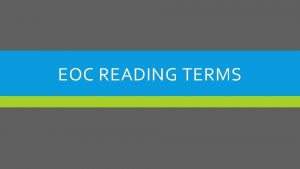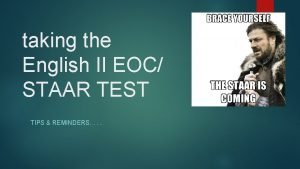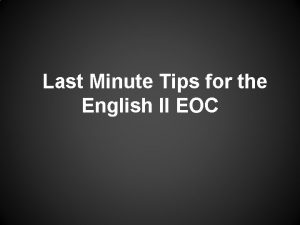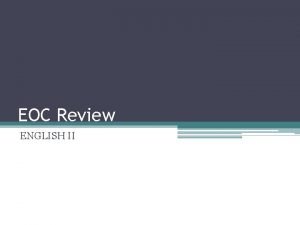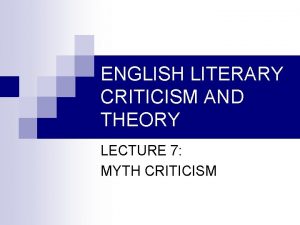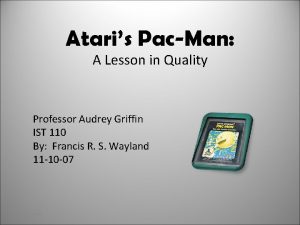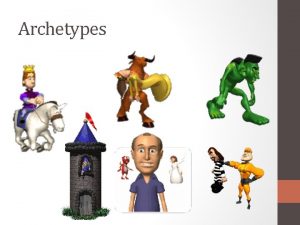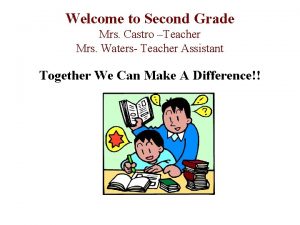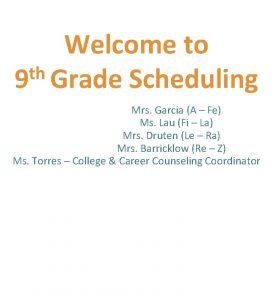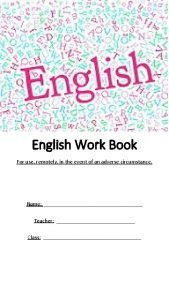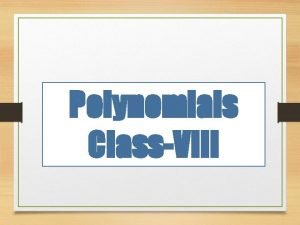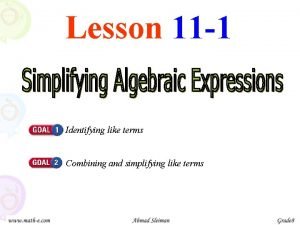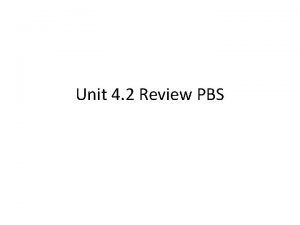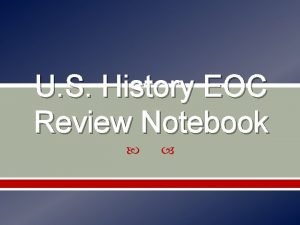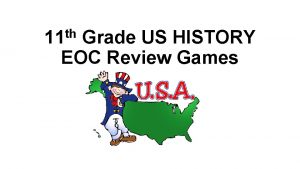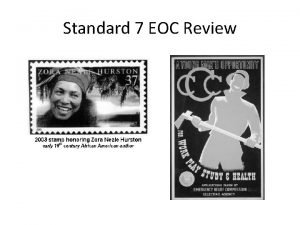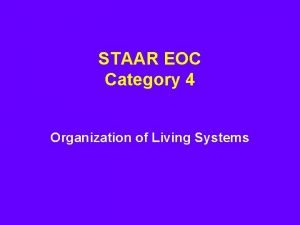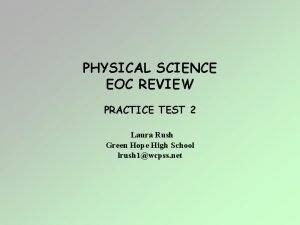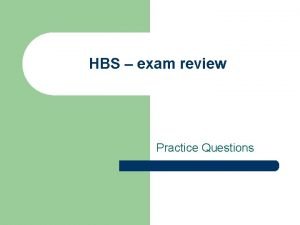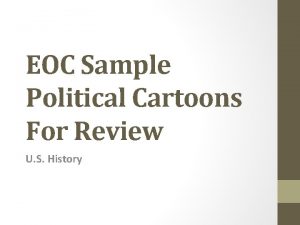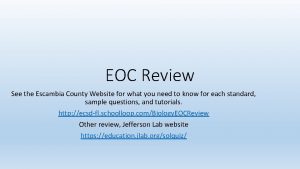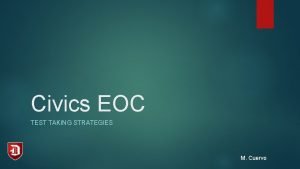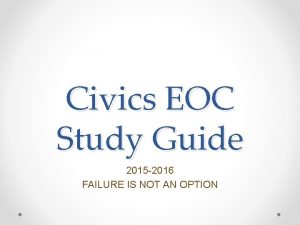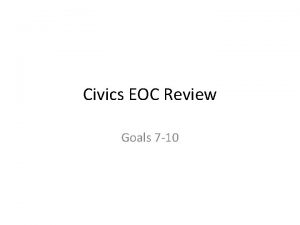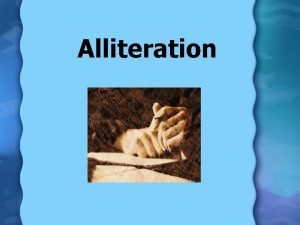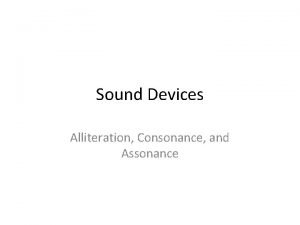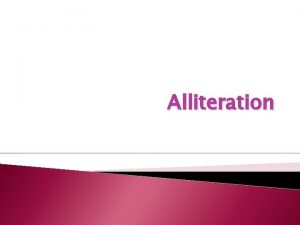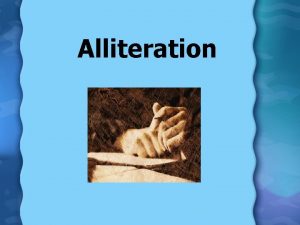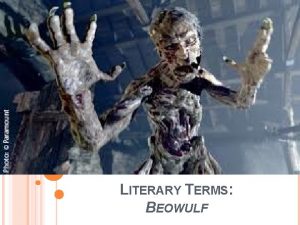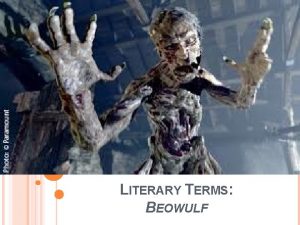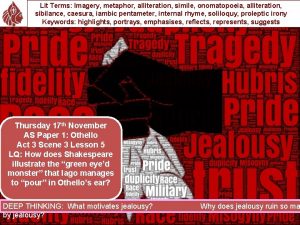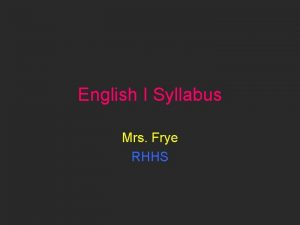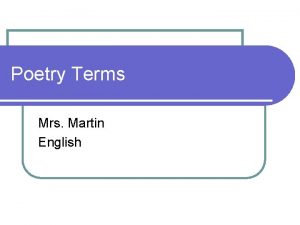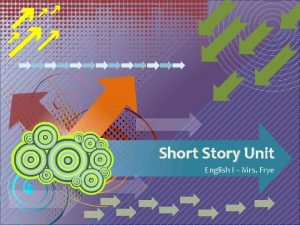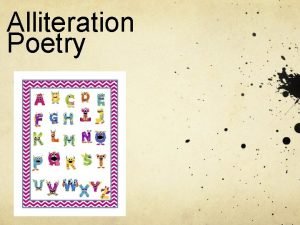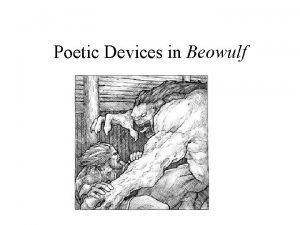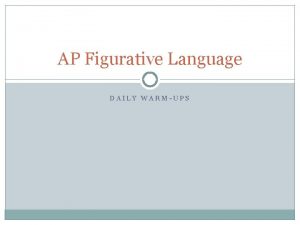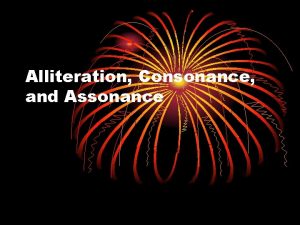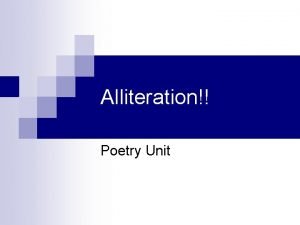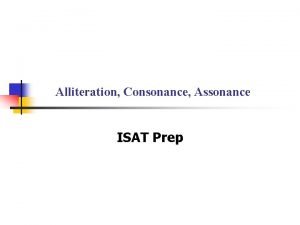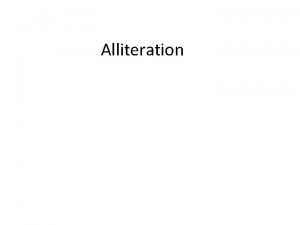English I EOC Terms Mrs Frye Alliteration The


































- Slides: 34

English I EOC Terms Mrs. Frye

Alliteration • The repetition of consonant sounds Falling Action • The action that takes place after the climax; where the conflict begins to face resolution

Allusion • An indirect reference/hint Fiction • Writing about imaginary characters and events

Antagonist • The “bad guy” or character that opposes the protagonist Figurative Language • Writing not meant to be taken literally

Assonance • The repetition of vowel sounds Foreshadowing • Hints to future events

Atmosphere • The mood and tone created by the author Genre • Type of writing – Drama, Horror, Poetry, etc.

Ballad • A poem narrating a story; usually sung – The Ballad of Gilligan’s Island

Bias • Slanted views Homeric Simile • A long comparison using “like” or “as”; used by Homer

Character • The people/things in a story Imagery • Words that ignite your senses

Characterization • The description of characters Inference • Using evidence to make a conclusion

Climax • The highest point of interest in a story Meter • The repetition of stressed and unstressed syllables in poetry

Conflict • The issue or problem in a story Mood • The way a story makes the reader feel

Connotation • The emotions a word arouses Denotation • The dictionary definition of a word

Dialogue • Conversation between characters Drama • A play

Verbal Irony • When a character says one thing, and means another; sarcasm Dramatic Irony • When the audience knows something the characters don’t

Situational Irony • The outcome of a story is the opposite of what is expected Epic • A long narrative poem about a superhuman character

Exposition • The beginning of a story where the background is stated Metaphor • Comparison of two things NOT using “like” or “as”

Moral • The lesson taught in a story Narrative • Writing that tells a story

Nonfiction • True stories Novel • A long, fictional story

Onomatopoeia • Imitation sounds – Buzz, Wham! Personification • Giving human characteristics to non-human things

Poem • Writing that takes on the nature of speech and song Plot • The sequence of events in a story

First Person Point of View • The narrator is a character in the story Second Person POV • The narrator is giving directions – Not used in stories – EX: recipe book

Third Person Limited POV • The narrator is an outsider from the story, but only knows the thoughts of ONE of the characters Third Person Omniscient POV • The narrator is an outsider and knows the thoughts of ALL characters

Protagonist • The hero or “good guy” in a story Purpose • The reason for a story

Repetition • Similar sounds Resolution • When the conflict is resolved

Rhyme • Repetition of sounds at the end of words Rhyme Scheme • A pattern of rhyming in poetry

Rising Action • Where the plot begins to get interesting and build to the climax Round Character • A character that is constantly changing

Scene • The setting of a story Setting • When/where a story takes place

Short Story • A short piece of literature that features a plot Simile • A comparison of two things using “like” or “as”

Stage Directions • Italicized words that tell actors what to do in a play Stanza • The “paragraph” in a poem

Static Character • A character that stays the same through the story Surprise Ending • The ending of a story that one didn’t expect

Suspense • Unexpectedness Symbol • An item that stands for something else – A cross stands for religion

Theme • The idea in a story Tone • The author’s voice while writing

Tragedy • A type of story that features a noble person falling due to a tragic weakness
 Eoc literary terms
Eoc literary terms Staar test memes
Staar test memes English eoc tips
English eoc tips English eoc review
English eoc review Poème ne pleure pas devant ma tombe
Poème ne pleure pas devant ma tombe Myth criticism
Myth criticism Tod frye
Tod frye Definition of archetype
Definition of archetype Esperimento frye e edidin
Esperimento frye e edidin Experimento de frye y edidin
Experimento de frye y edidin Phyllis randolph frye
Phyllis randolph frye They are mrs garcia and mrs castro
They are mrs garcia and mrs castro They are mrs garcia and mrs castro
They are mrs garcia and mrs castro Mrs. darling was ___________ of mrs. s.
Mrs. darling was ___________ of mrs. s. Polynomial classification
Polynomial classification Identifying like terms
Identifying like terms Florida us history eoc review
Florida us history eoc review Pbs eoc review
Pbs eoc review Gilded age eoc blitz review
Gilded age eoc blitz review Us history eoc review notebook
Us history eoc review notebook World power era eoc blitz review
World power era eoc blitz review Us history staar eoc review
Us history staar eoc review How hard is the biology eoc
How hard is the biology eoc Standard 7 eoc review
Standard 7 eoc review Youtub.eoc
Youtub.eoc Physical science eoc review
Physical science eoc review Physical science eoc review
Physical science eoc review Hbs eoc practice test
Hbs eoc practice test Us history eoc political cartoons
Us history eoc political cartoons Civics.360
Civics.360 Escambia biology
Escambia biology In a normal operations/steady state eoc activation level
In a normal operations/steady state eoc activation level Civics 360.org
Civics 360.org Civics eoc study guide
Civics eoc study guide Civics eoc review
Civics eoc review
